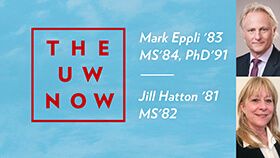If you invest in real estate, your finances should survive the COVID-19 pandemic fairly well, noted the speakers in The UW Now Livestream on June 30. They should, that is, as long as you’re not invested in malls and hotels.
“Retail,” said Jill Hatton, “poor retail. It had been challenged before COVID.”
Hatton, a graduate of UW–Madison’s famed real estate program, spent 35 years in the real estate investment industry. She joined Mark Eppli, a professor of real estate in the Wisconsin School of Business, to talk about how the COVID-19 pandemic has affected the future of our living and working space. Mike Knetter, president and CEO of the Wisconsin Foundation and Alumni Association and former dean of the Wisconsin School of Business, hosted the event and asked Eppli and Hatton questions submitted by the hundreds of viewers who watched live on YouTube.
Recession during a Pandemic
Eppli noted that the COVID-19 recession differs from the Great Recession that struck in 2008 in that today the real estate market is fairly strong.
‘‘In this pandemic, it’s very different. To be patriotic, we hole up and self-isolate.’’
“In short, in quick overview form, the commercial real estate markets were really kind of at a Goldilocks place going into the pandemic,” he said, asserting that the markets were neither too hot nor too cold. However, he allowed, there was “some bumpiness for retail and hospitality sectors. So real estate, to be clear, is in a very different place today than it was in 2007.”
Eppli contended that this economic downturn is a “black swan event,” a wholly unforeseen shock, much like the terrorist attacks of September 11, 2001. As after 9/11, the economy should recover, because basic economic conditions are strong. The millennial generation, he said, will soon grow into its prime home-buying years, adding demand for houses and apartments. However, he also cautioned that a recovery might take awhile, as the nature of the pandemic leads to a reluctance to engage in economic activity.
“I think one of the challenges we have,” he said, “and this is a big difference, is [that after 9/11,] President Bush came on the TV and told us to be patriotic: go out and live your life and spend. In this pandemic, it’s very different. To be patriotic, we hole up and self-isolate.”
Changes to Our Working Spaces
Hatton, who had helped teach Eppli when both studied under legendary UW real estate professor James Graaskamp PhD’65, agreed that 9/11 is a good analogy for the current economic situation. But she added that the pandemic is accelerating some previous trends. Office work, for instance, will likely shift to have more people working from home.
“Most people believe that there’s going to be a blended mix of working in the office, perhaps with less density,” she said. “Working at the bench with everyone shoulder to shoulder — it was losing some attractiveness before COVID.”
Struggling Retail
Similarly, traditional retail — and especially shopping malls — will likely suffer further loss.
“I guess I won’t say that all malls will be gone, but we’re over-retailed,” Hatton said. “We have too much retail in the United States compared to anywhere in the world. … There are too many malls and … they’re not set up to serve consumer demand.”
Eppli said that he believes that cities will come back strong after the pandemic. He noted that nearly three-quarters of Americans live in urban areas, that opportunities and earnings are greater in cities, and that these things will be true even after people internalize the impact of the pandemic and the virus’s rapid spread in population-dense areas.
“I remain rather bullish on cities,” he said, although he added that their success “does presume that we will have a vaccine and some degree of social spacing as we go along.”
The Future of Real Estate
Ultimately, Hatton gave a caveat: even those who have studied real estate for years can only have a limited view of the future.
“I think it’s really important to note that none of us really know what’s going to happen,” she said, “but if we can use our experiences … and our common sense, and also be sensitive with what we’re looking at as to what people want in their space, real estate is going to come through this COVID very efficiently.”
The UW Now Livestream is a response to the COVID-19 pandemic. Though originally planned as a series of events in cities across the United States, it is instead offered via YouTube and will continue through the summer. The next event will be July 14.
